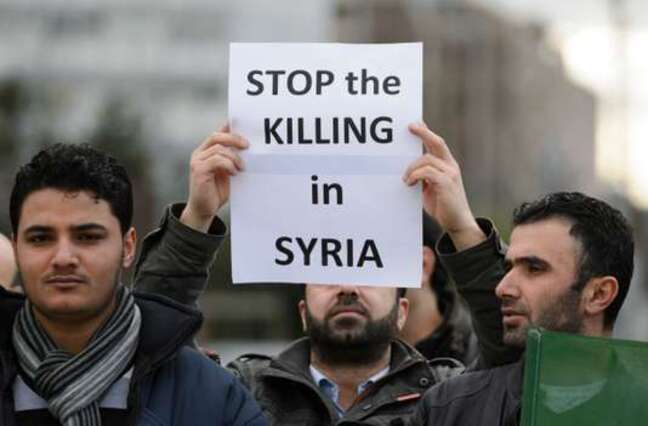In 2018, the Syrian government, supported by Russia and Iran, recaptured areas in Eastern Ghouta in Damascus countryside and Daraa governorate. Government forces used a combination of unlawful tactics, including prohibited weapons, indiscriminate strikes, and restrictions on humanitarian aid, to force anti-government groups to surrender in these areas, resulting in mass displacement. Anti-government armed groups indiscriminately attacked neighboring government-held areas and restricted civilians’ ability to flee hostilities.
At the time of writing, a tenuous ceasefire was holding in Idlib between the Syrian-Russian military alliance and anti-government armed groups. Anti-government groups in Idlib detained individuals attempting reconciliation with the government, media activists, and restricted humanitarian aid. After several reported chemical attacks during the first half of the year, in an unprecedented step, the Organisation for the Prohibition of Chemical Weapons (OPCW) was authorized to attribute responsibility for attacks in Syria.
In areas re-taken from the Islamic State (also known as ISIS), the high toll of the war in civilian casualties and damaged infrastructure became clearer. Landmines planted by ISIS before fleeing continued to kill and maim civilians. Little progress has been made in providing the necessary resources for recovery, and/or compensation for civilian victims of attacks. ISIS and Al-Qaeda affiliates in Syria continued to perpetrate abuses, ranging from summary executions and kidnappings to interference in aid delivery.
The Syrian Observatory for Human Rights (SOHR), a monitoring group based in the UK, estimated the death toll since the start of the war to be as high as 511,000 as of March 2018. Years of relentless fighting left 6.6 million displaced internally and 5.6 million around the world, according to the United Nations High Commissioner for Refugees (UNHCR).
At the end of the year, the Geneva-led political process remained at a standstill, and a new UN special envoy was appointed.
As active conflict partially decreases, Russia and Syria called for refugees to return and Syria passed laws to facilitate reconstruction. Despite this, government forces continued to violate human rights and international humanitarian law, arbitrarily detaining and mistreating people, and imposing onerous restrictions on freedom of movement.
Syrian-Russian Indiscriminate Attacks
Indiscriminate attacks on civilians and civilian objects by the Syrian-Russian military alliance persisted in 2018. In February, government forces launched a military campaign to retake Eastern Ghouta, an urban suburb of Damascus. Over 1,600 civilians were reportedly killed between February 18 until March 21. The Syrian-Russian military alliance struck at least 25 medical facilities, 11 schools, and countless civilian residences.
Similarly, on June 16, the alliance led an offensive in Daraa and Quneitra governorates, southwest of Syria, triggering massive displacement towards Jordan and the Israeli-occupied Golan Heights.
Use of Unlawful Weapons, including Chemical Weapons
Parties to the conflict continued to use unlawful weapons. The Syrian-Russian military alliance used internationally banned cluster munitions and chemical weapons in re-taking areas. Human Rights Watch investigated 36 cluster munition attacks between July 2017 and June 2018 and another two-dozen more possible cluster munition attacks. Evidence suggests the alliance used incendiary weapons in Ghouta and Daraa.
Between 2013 and 2018, Human Rights Watch and seven other independent, international organizations investigated and confirmed at least 85 chemical weapons attacks – the majority perpetrated by Syrian government forces. The actual number of chemical attacks is likely higher.
After a chemical attack on Douma in Eastern Ghouta, there were renewed international efforts to deter use of chemical weapons. Russia used its veto in the Security Council in February and April, preventing the creation of a UN-led investigatory mechanism. However, in June, states parties to the Chemical Weapons Conventions granted the OPCW permanent authorization to investigate and assign responsibility for chemical weapons attacks.
Abuses by Non-State Armed Groups
Between February and April, anti-government groups based in Ghouta – including Jaysh al-Islam, Ahrar al-Sham, and Faylaq al-Rahmane – killed and maimed hundreds of civilians in indiscriminate attacks on Damascus. According to the UN Commission of Inquiry, the armed groups regularly arbitrarily arrested and tortured civilians in Douma, including members of religious minority groups.
Hay’at Tahrir al-Sham (HTS), an Al-Qaeda affiliate present in Idlib, carried out arbitrary arrests and kidnappings that targeted local political opponents and journalists. Infighting left civilians dead, as did recurring assassinations and car bombings. The group continued to interfere with humanitarian access and aid distribution in areas under its control.
On July 25, ISIS led simultaneous incursions in al-Suweida governorate, killing at least 200 individuals and kidnapping 27 people. ISIS unlawfully executed one of the hostages in August. In November, all the remaining hostages were freed according to the state news agency. In the meantime, the fate of thousands of those kidnapped by ISIS in the east of Syria before they lost the territory remains unknown, with little effort by the Syrian Democratic Forces and US-led coalition to uncover their whereabouts.
Though the Syrian Democratic Forces (SDF) and the US-led coalition pushed ISIS out of Raqqa in October 2017, homemade landmines and explosive devices planted by ISIS before fleeing continued to kill and maim civilians. Between October 2017 and April 2018, more than 1,000 people have been injured or killed by mines, according to local medical workers.
Turkish Offensive on Afrin
On January 20, Turkey launched a military offensive in Afrin district in northwest Syria, previously under the control of the Kurdish-majority Autonomous Administration. As of March, the Turkish offensive reportedly resulted in the deaths of dozens of civilians, and displaced tens of thousands according to the United Nations. Turkish media reported the YPG launched indiscriminate attacks on Turkish border towns and killed at least seven civilians.
Turkish-supported non-state armed groups affiliated with the Free Syrian Army also seized, destroyed, and looted properties of Kurdish civilians in Afrin, while local activists reported at least 86 incidents of abuse that appeared to amount to unlawful arrests, torture, and disappearances by those groups.
Violations by US-Backed Forces and the US-Led Coalition
While the United States-led coalition re-opened investigations into civilian casualties from its strikes and admitted to inadvertently killing civilians, it did not provide transparency around these investigations nor compensation for victims. Although exhumation of mass grave sites began in Raqqa city, little support has been provided to develop clear protocols to preserve or forensically identify the dead.
The US assisted the SDF in northern Syria to detain hundreds of foreign ISIS suspects, and has begun returning suspected fighters to their countries, without transparency, raising human rights concerns.
The Syrian Democratic Council, a civilian authority operating in areas retaken from ISIS, and the Kurdish-majority Autonomous Administration overseeing displacement camps in the northeast, confiscated identification documents of displaced persons and arbitrarily prevented them from leaving the camps and moving freely. In a positive step, in September, the Syrian Democratic Forces pledged to stop recruiting children.
Since January, the Autonomous Administration and the Asayish, the local police, detained at least 20 members of the Kurdish National Council, a coalition of opposition Kurdish parties, and in some cases appear to have forcibly disappeared them.
Arbitrary Detention and Enforced Disappearances
As of August 30, more than 90,000 individuals were forcibly disappeared in Syria, most at the hands of the Syrian government, according to the Syrian Network for Human Rights (SNHR), a local monitoring organization. The Violations Documentation Center (VDC), a local monitoring group, has compiled 60,000 names of those detained by the government since 2011 whose fate remains unknown.
In July, the Syrian government updated civil registries to include death certificates for hundreds of individuals previously detained or disappeared by the government. The updates provided no specific details other than date and, occasionally, cause of death, and the government failed to provide the remains to the families. Meanwhile, the Syrian government continues to detain and mistreat individuals in areas under its control.
Russia, Iran, and Turkey have repeatedly made commitments to resolve arbitrary detention and enforced disappearances as guarantors of the Astana talks. In December 2017, the guarantors established a working group on detentions and abductions in the Syrian conflict. Yet, little progress has been made.
In March, the UN Commission of Inquiry on Syria issued a report on sexual and gender-based violence from March 2011 to December 2017 finding that the rape and sexual violence committed by government forces and associated militias amounted to war crimes and crimes against humanity.
Displacement Crisis
From January to April 2018 more than 920,000 individuals had been newly displaced inside of Syria, according to the UN. Neighboring countries – including Turkey, Jordan, and Lebanon – continued to prevent Syrians from seeking asylum at their borders, despite serious risks of violence. By September 2018, 5.6 million Syrians have taken refuge outside the country, the majority in neighboring countries.
More than a million Syrian refugees are registered with UNHCR in Lebanon. Lebanon’s residency policy makes it difficult for Syrians to maintain legal status. Seventy-four percent of Syrians in Lebanon lack legal residency and risk detention for being in the country unlawfully. In 2017, Lebanese authorities stepped up calls for refugees to return, despite the ongoing conflict and well-founded fears of persecution. A small number of refugees have returned to Syria under localized agreements, however these are not overseen by UNHCR. Some refugees have said they are returning because of harsh policies and deteriorating conditions in Lebanon, not because they think Syria is safe. Municipalities in Lebanon forcibly evicted thousands of refugees in mass expulsions without a legal basis or due process. Tens of thousands remain at risk of eviction.
As of May, Turkey had registered almost 3.6 million Syrian refugees in the country. Since January, however, ten provinces – including Istanbul and Hatay – suspended Syrian asylum seeker registration. Turkish security forces intercepted and deported thousands of newly arrived Syrian asylum seekers at the Turkey-Syrian border during the year, and summarily deported them to the war-ravaged Syrian governorate of Idlib. Turkey has stated that it will not open its border to asylum seekers fleeing hostilities in Idlib. Instead, Turkish authorities have opened several displacement camps in areas under their control in Syria.
As of June 2018, Jordan has registered around 666,294 Syrian refugees. Jordan categorically refused to open the border – closed since June 2016 – to incoming asylum seekers fleeing hostilities in the southwest. However, Jordan helped evacuate members of the Syrian Civil Defense, a humanitarian emergency response team affiliated with the opposition, whom Germany, the United Kingdom and Canada, among others, agreed to resettle. In 2018, Jordan began regularizing the stay of refugees without residency permits.
Russia refused to grant asylum to a Syrian national, claiming that his case was baseless given “the ongoing events on [Syria’s] territory have specific characteristics of a counterterrorist operation, not a classical military confrontation.”
The US renewed its grant of Temporary Protected Status (TPS) to almost 7,000 Syrians living in the United States, but did not extend the status to any new Syrians. It also maintained a ban on Syrian citizens entering the United States. The European Union’s response to the Syrian refugee crisis continued to fall short, with its emphasis on preventing arrivals from Turkey and confining those who do in overcrowded, unsanitary camps on Greek islands.
Reconstruction and Property Rights
The Syrian government passed Law 10 of 2018, empowering it to establish redevelopment zones for rehabilitation and reconstruction projects. The law empowers the government to confiscate residents’ property without due process or adequate compensation. In November, in response to international pressure, the Syrian parliament amended the law. However, there are still significant concerns in the law that remain unaddressed. In Qaboun and Darayya the government has restricted access for civilian residents seeking to return to their homes, and has unlawfully demolished residents’ private homes, without providing notice, alternative housing, or compensation.
Russia has called on the European Union and Western states to support reconstruction in Syria, currently predicted to cost at least US$250 billion. The European Union and the United States have maintained that they will not fund reconstruction in government-held Syria in the absence of a political transition along the lines of the UN Security Council resolution 2254. However, several European states, including France and Switzerland are seeking to support rehabilitation and stabilization efforts in areas re-taken by the government, or have opened humanitarian offices in Damascus.
In areas controlled by anti-government groups and the Syrian Democratic Forces, most Western donors continue to provide humanitarian aid. However, the United Kingdom and Netherlands have withdrawn their support for stabilization and resilience in northwest Syria. The United States also froze its funding for recovery and stabilization in areas captured from ISIS, asking the UAE and Saudi Arabia to step in to support local authorities, which they did.
Key International Actors
The UN-led political negotiations remained at a standstill, while Russia continued its attempts to politically legitimize the government’s military gains. In January, Russia hosted a Syrian People’s Congress in Sochi to agree on a new constitution. Though it failed to achieve its stated objective, the congress mandated the UN Special Envoy with the creation of a constitutional committee. The committee has not been created yet.
Russia, Turkey, and Iran continued their tripartite meetings on Syria, holding three summit-level meetings in 2018 and three rounds of talks in the Astana process, negotiations on de-escalation held regularly in Astana, Kazakhstan since 2017. Russia remains the primary arms supplier to the Syrian government.
The United States’ policies on Syria oscillated. In August, the US announced it would pull back hundreds of millions of dollars in funding allocated to rebuild parts of Syria previously held by ISIS. In September, the US announced that it intended to maintain a military presence in Syria, despite having announced a pullback earlier in the year.
The United States, United Kingdom, and France conducted airstrikes on April 14 in response to the reported chemical weapons attack on Douma. Israel also reportedly conducted several strikes on government-held areas.
In April, EU foreign ministers reiterated their joint commitment to “relentlessly” pursue the release of civilians detained and disappeared, and alongside the UN, co-chaired the Brussels II conference on Syria. It will host a third in March 2019.
In June, Germany's chief federal prosecutor reportedly issued an arrest warrant for a senior Syrian military official on charges of war crimes. France issued its own arrest warrants in November.
UN Security Council and General Assembly
In late 2017, the UN Security Council renewed the mandate for cross-border aid delivery. The humanitarian aspect of the Syrian conflict is one of few where the council maintains consensus. On accountability, the council remains deadlocked due to Russia’s use of the veto.
Meanwhile, the International, Impartial and Independent Mechanism (IIIM), a quasi-special prosecutor’s office established by the UN General Assembly in December 2016, continued to gather and preserve evidence for future criminal prosecutions. The body is reportedly opening two cases in 2018.






 Twitter
Twitter del.icio.us
del.icio.us Facebook
Facebook Digg
Digg Technorati
Technorati Yahoo!
Yahoo! Stumbleupon
Stumbleupon Google
Google Blogmarks
Blogmarks Ask
Ask Slashdot
Slashdot











